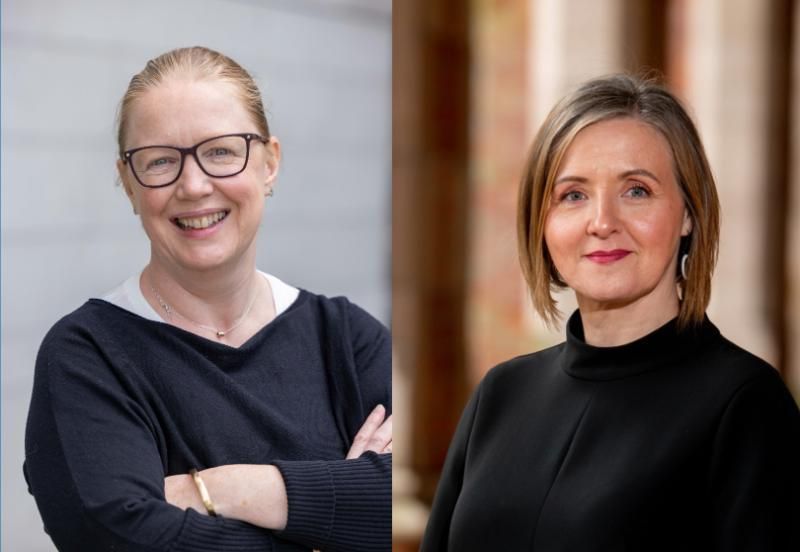North-South team to establish Living Observatory of Shared Languages and Identities on the Island of Ireland
Posted on: 11 August 2025
Researchers from Trinity and Queen's University Belfast have secured funding of approximately €3.7 million to establish a Living Observatory of Shared Languages and Identities on the Island of Ireland. The LIFELANGS project was announced today as one of four that will be supported by the North-South Research Programme (NSRP), administered by the Higher Education Authority.
This initiative is a key pillar of the Government’s Shared Island strategy, advancing an all-island research agenda that strengthens cross-border ties and delivers real, lasting impact for communities across Ireland and Northern Ireland.
Funded under the Emerging Hubs of Excellence Strand, the LIFELANGS observatory will aim to secure a more inclusive and resilient future for all and create a critical mass of interdisciplinary expertise and evidence-based resources in languages, education, and social sciences.

Prof. Lorna Carson, Professor in Applied Linguistics in Trinity’s School of Linguistic, Speech and Communication Sciences (left), is the Co-Principal Investigator on the project with Dr Aisling O’Boyle at Queen's University Belfast (QUB, right).
Project co-leads in Trinity are Drs Bronagh Catibusic, Colin Flynn and Kathleen McTiernan, and those at QUB are Drs Ian Collen, Mel Engman and Sultan Turkan.
Prof. Lorna Carson said: “We are truly honoured to receive support from the North-South Research Programme for the LIFELANGS project. This funding will help us record and understand the lived experiences of communities all across the island, north and south, exploring the multiple everyday ways that languages shape identity, belonging, and connection.”
“The project offers a unique opportunity to foster collaboration across disciplines, borders, and communities, and we’re deeply grateful to all those who have supported us along the way, especially the many external community partners who will become part of our observatory.”
Specifically, the four-year initiative will create a new centre dedicated to studying the languages and identities of communities in Ireland. The centre will gather knowledge from various fields like language, education, and social sciences to produce helpful, research-based resources for everyone.
People in Ireland, north and south, have expressed the desire for a more inclusive society, with a focus on better supporting language learning and promoting understanding between different cultures. This project will highlight the diversity of languages and cultures by working with local communities to observe how people use different languages and live in a variety of cultural settings. It will also focus on how people of all ages learn and use languages—both spoken and signed—throughout their lives, in places like schools, workplaces, and social spaces.
By partnering with local groups, the researchers will collect data that reflects the needs and experiences of all citizens, including those who are often overlooked or difficult to reach due to social, political, or geographical factors.
The centre will use ideas about understanding different cultures and how different parts of our identities—like age, gender, health, abilities, and ethnic backgrounds—affect how we live our lives. This will help create tools for teaching and learning about languages and cultural awareness.
Researchers will engage with lots of external partners through workshops and language-related events, networking, and via knowledge sharing based on collaborative and community partnerships. The team will work “with” people and communities, rather than conducting research “on” languages, and listen and learn from external partners.
Additionally, collaborative and community partnerships in data gathering will ensure citizen involvement for policy design, particularly those diverse and dispersed stakeholders who may be defined in research, social, political or geographical terms as “hard to reach” communities.
Framed by concepts of critical interculturality and intersectionality, the team will develop evidence-based language and intercultural awareness education tools essential for a shared island. Researchers will develop, maintain, and provide access to resources on how people use, learn and teach languages across the island.
The observatory will uncover how cultural and linguistic identities intersect with dimensions such as age, gender, class, health, disability, sexuality, race, religion, and ethnicity to provide a better understanding of how to build shared dialogues, social cohesion, and inclusivity for a shared future on the island of Ireland.
Media Contact:
Thomas Deane | Media Relations | deaneth@tcd.ie | +353 1 896 4685
